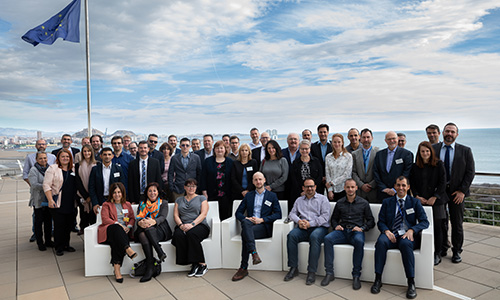- EUR 65m loan to KCM AD to increase the company’s production by 25%
- Construction of a new lead refining plant and a zinc electrolysis unit, replacing outdated facilities
- Better environmental performance, increased recycling rates of waste materials, and improved working conditions
The European Investment Bank (EIB) has agreed to provide a EUR 65m loan to KCM AD, a Bulgarian producer of lead and zinc, to raise its production output by 25%. At the same time, the company’s use of recycled materials will increase significantly, resulting in a more efficient and sustainable production process. KCM’s zinc is used in galvanised steel products, the production of die-cast alloys and of brass and bronze products, while its lead is primarily directed towards the automotive and industrial battery sectors. The company employs more than 1 500 people.
The agreement is backed by the European Fund for Strategic Investments (EFSI), the heart of the Investment Plan for Europe, also known as the Juncker Plan. Thanks to its guarantee, the EIB is in a position to support a patent-holding company in a cohesion region in an effort to render its production more sustainable.
“European support can do a lot to push heavy industry to sustainable levels,” said EIB Vice-President Lilyana Pavlova and continued: “Backed by the Investment Plan for Europe, our loan will help KCM AD to make better use of natural resources and decrease the energy intensity of its production cycle. Both measures will make the company more competitive, and will secure more than 1 500 jobs in one of Europe’s cohesion regions. This shows that circular economy and climate action go hand in hand with the ambitious social and employment targets of the European Union.”
European Commissioner for the Economy Paolo Gentiloni added: “Making our traditional industries more eco-friendly and modern is key to boosting energy efficiency. With EUR 65m in EIB financing under the Investment Plan for Europe, KCM can upgrade and update its manufacturing processes. This investment will help to support more than 1 500 jobs in the region.”
CEO and Chairman of the Board of Directors of KCM 2000 AD Rumen Tsonev stated: “The EIB support would help KCM enter the next investment period with confidence, securing their market position as a leading European company in the recycling of non-ferrous metals, which are in great demand. It will therefore also contribute to more sustainable development goals.”
KCM AD will use the EIB loan for its technological upgrade programme for 2020-2023. The programme provides for the modernisation and expansion of the company’s lead and precious metals refining unit and zinc electrolysis unit. The project will increase the recycling capacity for different types of secondary waste lead and zinc materials by 15 percentage points. Secondary materials currently make up some 20% of the total refined lead and zinc output, while the project will bring the share of secondary materials to about 35%. This is high by EU-standards: other European primary smelters report a recycling share of only 10% to 15%.
KCM AD, owned by the KCM 2000 Group, is a Bulgarian medium-sized smelter of lead and zinc accounting for about 1% of global output and 3% to 4% of European output. It is the only smelter in Central and Southeast Europe, with its closest competitors in Poland and Italy. The positioning makes it a strong regional player with a significant market share in its main markets in Eastern Europe and Turkey, with extensive knowledge and with long-standing relationships with each customer.


